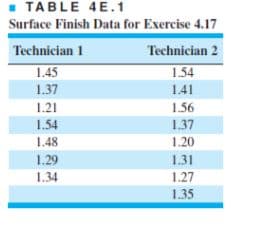a) Test the hypothesis that the mean surface finish measurements made by the two technicians are equal. Use a = 0.05 and assume equal variances. (b) What are the practical implications of the test in part (a)? Discuss what practical conclusions you would draw if the null hypothesis were rejected. (c) Assuming that the variances are equal, construct a 95% confidence interval on the mean difference in surface-finish measurements.
a) Test the hypothesis that the
equal. Use a = 0.05 and assume equal variances.
(b) What are the practical implications of the test in part (a)? Discuss what practical conclusions you
would draw if the null hypothesis were rejected.
(c) Assuming that the variances are equal, construct a 95% confidence interval on the mean difference in
surface-finish measurements.
(d) Test the hypothesis that the variances of the measurements made by the two technicians are equal.
Use What are the practical implications if the null hypothesis is rejected?
(e) Construct a 95% confidence
measurement error.
(f) Construct a 95% confidence interval on the variance of measurement error for technician 2.
(g) Does the normality assumption seem reasonable for the data?

Trending now
This is a popular solution!
Step by step
Solved in 4 steps




